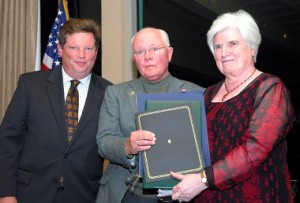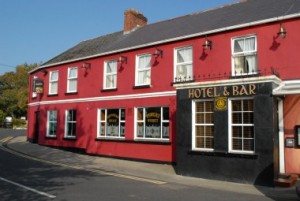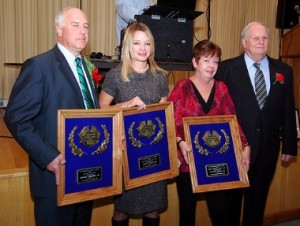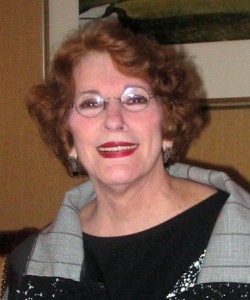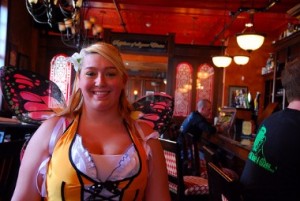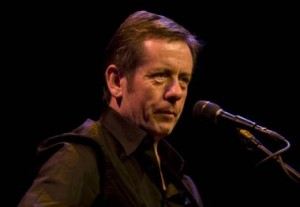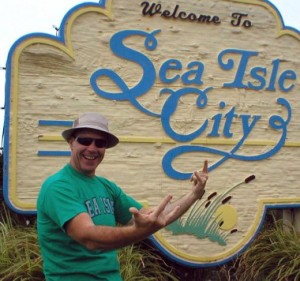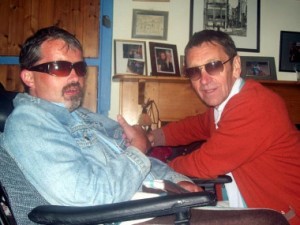
Donnacha Rynne with his friend, Tom Prendergast, who recorded the conversations that became part of "Being Donnacha."
Just the Moon
Just the Moon
Delicate light for the eye
Standing on dewy pastures
Dampening of toes
Dark but gentle light lit sky
Just the Moon
Whispering waves.
Now, silence after a day of sun, lie, lotion
Leave behind delicate night and retire
To summerhouse slumber on wheels.
As I enter this wheel house Waterboys on
Hole in the moon, this is the sea, this is the sea,
It is a dwelling for me – beautiful.
—Donnacha Rynne
Being Donnacha Rynne has never been easy. Born six weeks premature, and diagnosed with cerebral palsy by doctors who told his parents that he would never walk, never attend school and would eventually need to be institutionalized, Donnacha was just a small boy when he determined that his life would not turn out the way the doctors predicted. Instead, he went to school, worked at various jobs, and owns his own house.
So when he developed multiple sclerosis in his early 20’s, a twist of fate that seems too unjust to comprehend, Donnacha continued on in the only way he knew how.
“Donnacha’s spirit gave him the strength to overcome everything he’s been dealt. The doctors’ diagnosis when he was born wasn’t wrong, it’s his spirit that’s outshone what they said,” Anne Rynne, Donnacha’s mother explained.
And now, at age 40, dependent on a wheelchair for his mobility and requiring full-time caregivers to make sure he is dressed, fed and allowed to live life as fully as he can, Donnacha has written “Being Donnacha,” a book that he hopes can speak not only of his own life, but also provide a voice for all the other disabled people who so often go overlooked and unheard in today’s world.
I first heard about Donnacha’s book quite by accident this past summer as it was going to press. Someone posted a link to the website where pre-orders were being taken, and it caught my interest. I ordered a copy, and then promptly forgot about it until the book arrived a few weeks ago. Life was pretty busy at that time, and so it sat there in its wrapper for a few days. But when I did take it out, and sat down to read it, I found I was unable to put it down. It’s not very often that a few pages into a book you realize that you’re reading something that has the ability to change the way you view the world, but that’s exactly what Donnacha’s words did for me.
It’s a story that is bursting to be shared with the world beyond Donnacha’s backyard in Miltown Malbay, County Clare. Because Donnacha isn’t up for a lot of conversation and questioning these days, I arranged to talk with his mother Anne, who is delighted to be used as a mouthpiece for the son she is rightly so proud of.
“Donnacha has been hugely inspirational for our family, we all take our lead from him. When Donnacha’s well, we’re all well. He’s always very positive, he’s never asked ‘Why me?’ He has something to say to people that’s very seldom heard. People in wheelchairs, people who are disabled, are still people. For Donnacha, his life is about waiting, waiting, waiting, but as he’s gotten more dependent on others, he’s still Donnacha. This book is his truth, and people will get great messages from it. He’s a voice for the voiceless.”
This increasing dependence on others has been one of the most difficult things for Donnacha to come to terms with. Living on his own, in his own house and being independent, had been a source of great pride for him. But even through his frustrations, Donnacha is able to write about his ability to create his own positivity: “There is always hope. If there is no hope there is no future. It’s the only way forward. There is an air of gentleness about hope.”
The strength of Donnacha’s family is a huge part of his story. One of five children of Anne and Davoc Rynne, Donnacha has an identical twin brother, Niall. His parents decided that there would be no preferential treatment for him. That meant going to the local school, where life among other children was often a challenge. He didn’t have many friends there, and his sense of being different led to him keeping his distance. He was also made fun of occasionally, which Donnacha attributes to his peers’ “ignorance and fear.“ Having Niall there to shelter him was both a blessing and a curse.
“School was very difficult here in Clare. When Donnacha was twelve, he asked to live in Kildare with his aunt and uncle, and we let him. I suppose it was a bit radical to do that, but he was so determined. We thought, if Donnacha has the strength to do that at twelve, who are we to stop him?” Anne reflected. “He stayed up there three years. It worked and it didn’t work. He really needed to get away from Niall and be able to be his own person. That was no reflection on Niall! Donnacha and Niall have always had a very close relationship. Niall’s absolutely amazing, a tower of strength. There’s a very strong connection between them. Niall would always know when Donnacha wasn’t well. Even when Niall moved to the States for 10 years, he always knew when something was wrong.”
“Donnacha is very close to all his brothers and his sister. Niall and his youngest brother, Turlough, live here [in Ireland], and get home as often as they can. Davog, the oldest, lives in France, and Aine, his sister, lives in Vietnam. But with Skype, we can visit them easily!”
His siblings aren’t the only family that Donnacha is close to. He has a pair of uncles, Christy Moore and Luka Bloom, well known Irish folk singers (Moore was a founding member of Planxty and Bloom will be appearing in Sellersville next week) who play a major role in his life. In fact, it was Luka (Uncle Barry to Donnacha), who felt that Donnacha had a book in him. (Read our interview with Luka Bloom this week.)
“Two years ago I was sitting with Donnacha, having one of his fantastically hilarious and philosophical discussions, during which he complained that people had no time to visit him. ‘I wish people would embrace the nowness of life,’ was the phrase he uttered, and it followed me out the door when I left him,” Bloom explained in a recent interview. “Donnacha is not given to long sentences, and so he has mastered the art of encapsulating big pictures with very short sentences.
“Outside in the car, I determined there and then that a book must emanate from this important man,” Bloom said. “I knew he had too much to offer to be ignored because of logistics. I spoke with Anne and others about this, and together we conspired to bring to fruition this most important event in our lives: The release of Donnacha’s book, the manifestation of his voice, his gift to the world. We are so blessed that he is among us, and so proud of him. He is the bravest man I know.”
To do the actual work of writing down Donnacha‘s words, they knew they needed someone who was close to him and who would understand his quirkiness, but wasn’t a member of the family. Longtime friend Tom Prendergast was just that person. Once a week, for two and a half years, Tom would spend time with Donnacha, recording their conversations. It could be difficult at times, because “Donnacha literally lives in the now, in the moment, it’s part of CP, the difficulty to answer questions. Tom gets Donnacha, he gets his humor. He is a great man, a great character,” Anne explained.
There are three sections to the book: the first is Donnacha’s story, the second is comprised of sixteen poems that he wrote between March and August of 1989, and the third is titled “Knowing Donnacha,” with a series of pieces written by friends and family members who know and love him.
“Donnacha was nineteen when he wrote the poems,” Anne said. “They’re fantastic. I can’t get over how fresh they are seeing them in print.
“He has good days and bad days now, just like we all do. But he’s very strong—very strong and very frail. Donnacha was born old, he’s always been very wise and philosophical. I believe he still has a little journey to go yet. Writing this book has kept him going. He has a message for people, so that maybe they won’t feel so isolated.
“When Donnacha was young, we had him going to see a lot of different doctors, therapists and psychologists. But he always knew when the therapists were talking down to him and being patronizing. When he was seven, we had a psychologist tell us that he was dull. Dull! How insulting for starters. Donnacha was the light in our family. I am completely humbled by him. He’s just a regular guy who was dealt a tough hand.”
And plays it well.
The book “Being Donnacha” is available for purchase worldwide on the web.
If you’re in Ireland, you can pick up a copy in Hurley’s and the post office in Miltown Malbay, and in Sceal Eile (The Other Story) Bookshop in Ennis.
